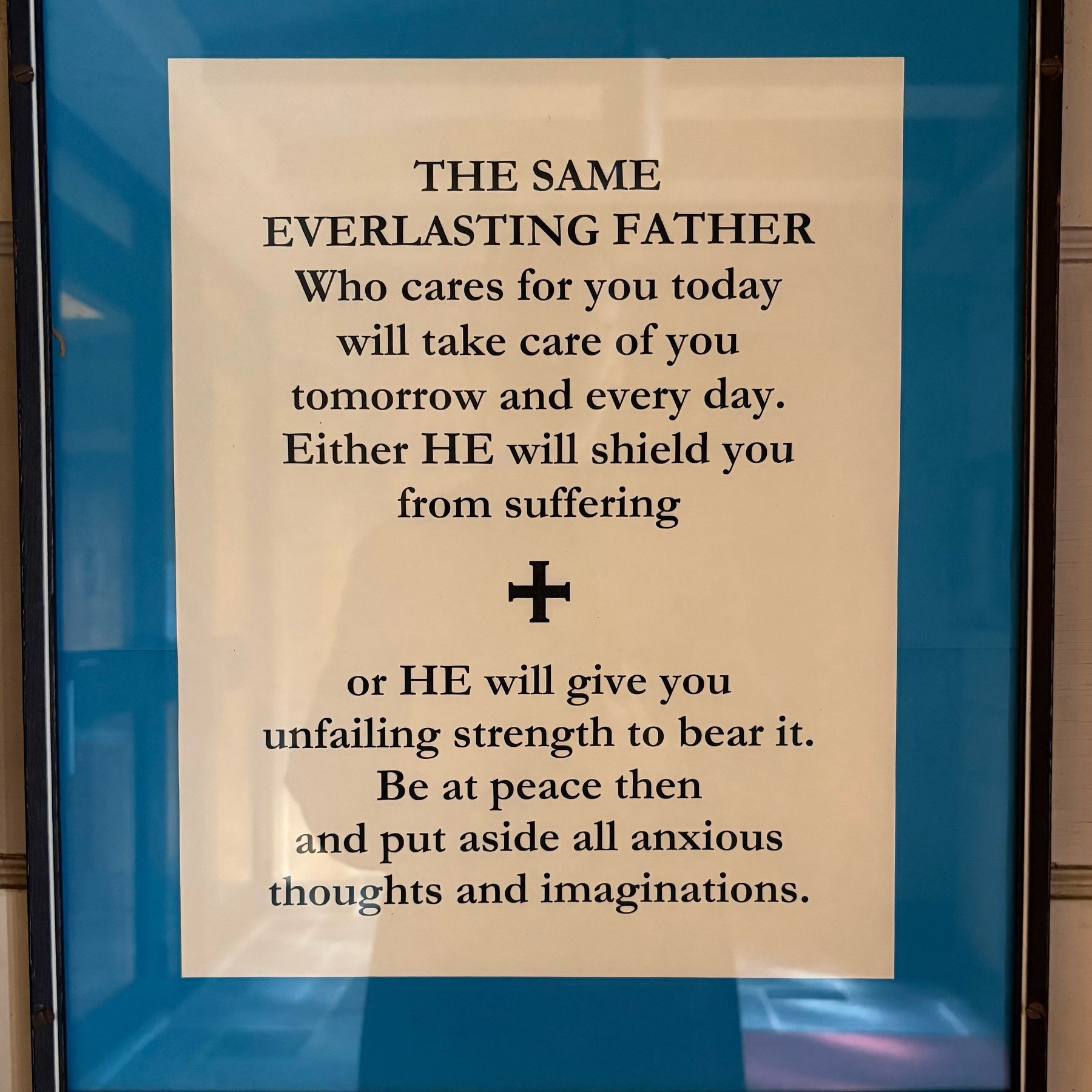En route

En route


As predicted, lots of putzing around. Hung some blinds. Will be upgrading an old laptop with an SSD to give it some new life and speed. Switched out the green breviary for the blue breviary and moved all the prayer cards, cheat sheets, and bric-a-brac to the new book. The Christmas decorations have come out and there are plans afoot to begin decorating in earnest once some of the working kids get home. We knocked out the first drop of Stranger Things and the latest episode of Plur1bus. This morning’s run was a nice and crispy 32 degrees and there were a few other folks on the greenway, plus the usual deer and squirrels.
Like the deer that years for running streams…
I felt so good after the run that I busted out a variation of one of the prayers from the Liturgy of the Eucharist in thanksgiving:
Blessed are you, Lord God of all creation for through your goodness we have this day on offer. Fruit of your love and gift beyond all reckoning, may it be for us the time of our salvation.
When bits of the liturgy start coming out in weird places, I can’t help but think that’s a good sign. Let those walls between Sunday and the rest of the week dissolve into one glorious act, like a watercolor blending from one color to another.
Glorifiquen al Señor con su vida. Pueden ir en paz.
Amen.
They say that people can be divided into two groups - those who get up early to drink mimosas and those who opt for the local Turkey Trot road race. We’re both around here, so our Thanksgiving started with the Borodash, a reasonable 4-miler that meanders around the downtown area and is the main fundraiser for several local charities. We’ve been doing it for years - my wife has run nearly all of them, starting with the first. As the kids have gotten older, they’ve joined in, and we added matching team shirts a while back just for fun. Some of us run, others walk, or mosey along. Either way, the weather was beautiful. The mimosas afterward were good too.
The rest of the day was final food prep, kid-related chaos and noise, the parade and dog show, some sports that no one really watched closely, and, finally, a whole lot of eating. Topped it off with some of Stranger Things season 5.
Today is mostly just putzing around with some house stuff: getting caught up on laundry and other minor projects. I slapped together some nesting boxes yesterday to replace the ones that are falling apart. My carpentry is terrible, but if the birds will move in, that’s all that matters. We have a lot of bluebirds around here year-round, and I think that our boxes - which stay pretty busy throughout the breeding season - are part of the reason. The other project on my to-do list, probably over Christmas vacation, is a Two-chambered Rocket Box for bats. I have a spot in the very back of the yard, which would be ideal, so it just remains to hit Home Depot and do a little shopping. I also need to figure out exactly how I’ll be mounting it up as high as bats like, but I’m sure we can come up with something. A ladder is not part of the equation. I’m not risking my life for bat habitat.
I had a chance to meet with the pastor at my new assignment the other day. It was very good to see him again, get caught up a little, and hear his various thoughts on the parish, the people, and their pastoral needs. Very much looking forward to getting to know everyone soon. Between now and then, there’s a bit of travel for work, all of Advent, most of Christmastide, and - ha! - ordination itself. Trying not to get too far over my skis in terms of planning or thinking. There’s plenty to do in the present moment, right now. Staying collected. Intentional gratitude. Continual conversion. Work. Prayer.
I am closing in on the end of The Idiot and used an AI (yes) to generate some suggestions for what to read next and it came up with the following, among others:
So my year-end reading is pretty much set, alongside whatever book-of-the-now is commanding the podcasters attention and the occasional review of our formation texts.
The Diocese announced our assignments today, so I can publicly share that after ordination, I will be serving at St. William of Montevergine in Shelbyville, starting on January 5. The January start gives us all a few weekends at our home parishes, which will be nice. It’s all very exciting!
I wasn’t familiar with St. William of Montevergine, but I learned that he was a Benedictine, and a hermit to boot. He sounds like my kind of guy.
This is a formation weekend, possibly our last one, so we’ll report tomorrow for more liturgical practica, homiletics, and prayer. Excited to get started, but also a little wistful about this period - formation - coming to a close. Yes, they certainly tell us that formation never actually ends, but this expression of it certainly will.
Y por los que hablan español - por favor, su paciencia. Entiendo casi todo, pero estoy mejorando mi vocabulario teológico. Ya puedo leer (y a veces escribir) en español, entonces puedo asistir en la misa como diácono; pero tambien queiro predicar!
Still kicking the tires on org-mode, but I don’t think it’s for me right now. The main attraction I can see is To-do list/calendar/agenda integration, but we live and die by a shared iOS calendar and it takes a fair amount of idiocy to integrate it into anything outside of the Apple ecosystem, even if I just need read-only access to it for the sake of visibility. At most, I’ll take a look at the Obsidian-like features to see if they’re something I can use, or heck, revisit Obsidian itself. These systems are a bit like shopping for new notebooks. I love the idea of them, but have been fair-to-middling in my long-term adoption of them.
As it is, I have a couple of notebooks I go back to semi-regularly: one for work-related stuff, and another one that serves as a sort of spiritual journal which goes with me on retreats, though I’ve been known to scribble in it occasionally at home. A third notebook has sort of emerged as the place where I keep my homily notes. I may or may not refer to them while I’m speaking, but the act of writing them down with a pen helps me keep the main points in mind. I used a note-taking app on an iPad for a few years and it wasn’t bad, but I still prefer the low-tech/high-reward touch of pen and paper.
I started The Last Invention. About done with the first episode and it’s pretty good so far. Andy Mills was on The Dispatch the other day discussing the series, if you want to listen to a nice overview. It was good to get a reminder of how submerged in the tech landscape I still am, relative to how not submerged everyone else is. At the same time, I tend to be closer to nuts-and-bolts of technology without paying as much attention to the macro-trends which, to my ears, blend a little too easily with marketspeak and investor hype. I mean, one flavor of AI accelerationist seems to think that the goods to be obtained - a world of complete abundance made possible by AGI and a massive robotic workforce - are worth the short-term costs. Maybe they are, but I’m skeptical. Fallen man and all of that. Even if the promise does comes true, then what? Do they believe that everyone alive simply transitions to a sort of eternal retirement of leisure? AGI will usher in an end to disease and suffering? Paradise on Earth, almost within reach?
I’m skeptical for a few reasons. The first is practical. The hype-cycle around AI right now feels exactly like the early 90’s, the point at which the commercial Internet really took off and became A Real Thing. Many predictions were made, and a few of them came true, but most - if not all - of those initial market darlings faded away or collapsed once it became clear how those pesky customers would actually start using things. And that cycle was preceded by the first big chip explosion which was led, at the time, by firms like Fairchild Semiconductor. Unless you’re into deep tech, you’ve probably never heard of them, but you’ve certainly of the companies started or run by Fairchild alumni: Intel, among others. I remember walking the tradeshow floor at two of the biggest Internet-related events in the mid-90s and I can only remember two or three of the hundreds of companies in the exhibit space.
Our ability to accurately predict tech trends seems a bit suspect to me. No one at Internet World saw the rise of social media, and no one riding the initial wave of social media saw the directions it would take us or the damage it would inflict on society. About the only prediction I’d confidently make about AI is that it will certainly change things, and those things are likely to be related to porn since that’s the gravity well that all tech seems to orbit.
Secondly, and maybe this is just an artifact of being a slightly grumpy old man in the tech space, tech never seems to work quite as well in practice as it does in the advertisements and investor presentations. Have you tangled with a printer lately? Exactly. Given the inexorable urge to monetize All The Things, the AGI-powered robot in your home is likely to be belting out commercial jingles 24-7 or stocking the fridge with products willing to pay for best placement, unless you’re willing to pay for Robotic Help Platinum, offering a Reduced Advertisement Experience for only 59.99/month. If the urge to innovate is strong, the urge to enshittify has proven to be nearly as strong.
But the reason I’m not feeling the imminent-Eden scenario is that sin is still a thing, and that however hard the AI folks want to believe otherwise, humans will find ways to sin and will keep doing so until the Lord returns to wrap it all up. We will, of course, be focused on this very thing this Sunday. Envy, wrath, lust, acedia…all of it will find a home in whatever place we inhabit, however shiny and new it happens to look.
To be clear - and I say this as someone who uses chatbots pretty regularly for various things - I think the tech is pretty neat and has the potential, even if it doesn’t progress any further than it has today. Like all tools, it has its proper place and we should think prudentially about where it’s used, and by whom, and for what purposes. Any tool can be abused, and serve to do injury to the dignity of the human person; this one is no exception, and carries the additional dangers of being opaque in its operation while simultaneously presenting itself as coldy impartial. I’m thankful for the work that the Holy See has done in this area and recommend the book produced by the AI Working group: Encountering Artificial Intelligence.

Got the other trees into the ground yesterday, as I was hoping to have them planted before a whole pile of rain comes drifting into our area. It was…weirdly warm and today got into the mid-70s. I’m not complaining (much) but I have a feeling that we’ll be paying for it later on in the year.
Remember when you were grousing about the heat? How do you like this, good sir? as we watch the mercury drop even further and our faces hurt from the air.
We have our assignments but are under a strict embargo until they’re announced by our bishop. They’re his prerogative, so he gets to make the announcement which, I think, will be this weekend. Until then, lots of quiet preparation and prayer. I’m teaching OCIA tonight and our subject is The Liturgical Calendar, which is unquestionably the critical hinge point on which the entire creed rests. It will be a barn-burner, I can tell you. There may or may not be levitation; you’ve been warned.
I will, as in years past, start with a small explanation of what liturgy is and isn’t, what it requires and what it most certainly does not require. I also have the opportunity of maybe going down one of my favorite rabbit holes, which is the dating of Christmas and the inevitable questions around who cribbed from who in terms of the winter solstice. If you’d like to know more, take a look at Calculating Christmas by William Tighe or the very excellent The Origins of the Liturgical Year by Thomas Talley, who is Tighe’s main source. It is…exhaustive, and also magnificent.
As long as we’re at the outer limits of nerd, I’m writing this from emacs org-mode. Why? I’m still not entirely sure yet. The organizing tools intrigue me, and I’ve made an embarrassing number of attempts to learn emacs over the years before inevitably returning to vim for editing stuff; org-mode seems like an interesting use-case for which it might be worth learning…all the rest. The jury is still out, I’m afraid. I want to try to get calendar syncing working, at least in read-only mode before I take the big plunge. Writing here and posting directly to the blog is something I was able to do in VSCode too, both functions thanks to Claude who wrote the plugins/scripts/doo-dads to make it possible.
Postscript: class went well. Nobody asked about Christmas, which was fine.

Currently reading: I, Rigoberta Menchu by Rigoberta Menchu 📚